虚拟语气
英语中三种虚拟语气
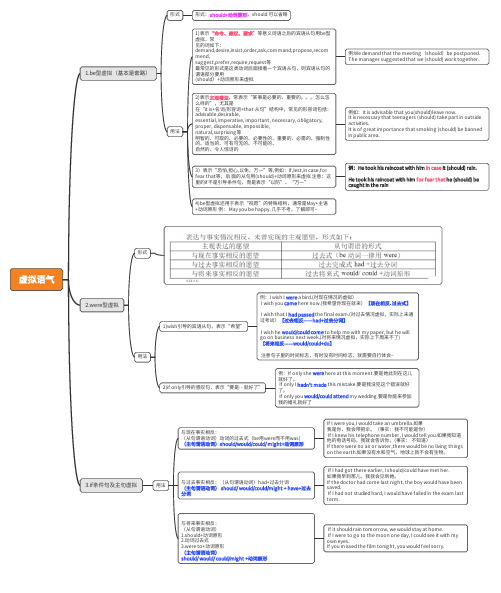
虚拟语⽓1.b e型虚拟(基本是套路)2.w ere型虚拟3.if条件句及主句虚拟形式⽤法⽤法1)表⽰“命令、建议、要求”等意义词语之后的宾语从句⽤b e型虚拟,常⻅的词如下:d e m an d,d es i re,i ns i s t,or d er,as k,co mm an d,p ro p ose,reco mm en d,sugges t,p re f er,re q u i re,re q ues t等最常⻅的形式是这类动词后⾯接着一个宾语从句,则宾语从句的谓语部分要⽤(s h oul d)+动词原形来虚拟2)表⽰主观看法,常表⽰“某事是必要的、重要的。
怎么怎么样的”,尤其是在“it i s+名词/形容词+th a t 从句”结构中,常⻅的形容词包括:a dvi sab le,d es i ra b le,essen ti al, imp era tiv e, imp or t an t, necessar y, o b l i ga t or y,p ro p er, di s p ensa b le, imp oss ib le,na t ural,sur p r i s i ng等明智的、可取的、必要的、必要性的、重要的、必需的、强制性的、适当的、可有可⽆的、不可能的、⾃然的、令⼈惊讶的3)表⽰“恐怕,担⼼,以免,万一”等,例如:if,les t,i n case,f orf ear th a t等,后 ⾯的从句⽤(s h oul d)+动词原形来虚拟 注意:这⾥的if不是引导条件句,⽽是表⽰“以防”、“万一”4)b e型虚拟还⽤于表⽰“祝愿”的特殊结构,通常是M a y+主语+动词原形 例: M a y y ou b e h a ppy. ⼏乎不考,了解即可~与现在事实相反:(从句谓语动词)动词的过去式(b e⽤w ere⽽不⽤w as)(主句谓语动词)s h oul d/w oul d/coul d/ mi g ht+动词原形与过去事实相反:(从句谓语动词)h a d+过去分词(主句谓语动词) s h oul d/ w oul d/coul d/mi g ht + h a v e+过去分词与将来事实相反:(从句谓语动词)1.s h oul d+动词原形2.动词过去式3.w ere t o+动词原形(主句谓语动词)s h oul d/ w oul d/ coul d/mi g ht +动词原形形式:s h oul d+动词原形,s h oul d 可以省略If it s h oul d ra i n t o m orro w, w e w oul d s t a y a t h o m e.If I w ere t o go t o th e m oon one d a y, I coul d see it with myo w n e y es.If y ou mi sse d th e fi l m t on i g ht, y ou w oul d f eel sorr y.If I h a d go t th ere earl i er, I s h oul d/coul d h a v e m e t h er.如果我早到那⼉,我就会⻅到她。
虚拟语气的用法及例子
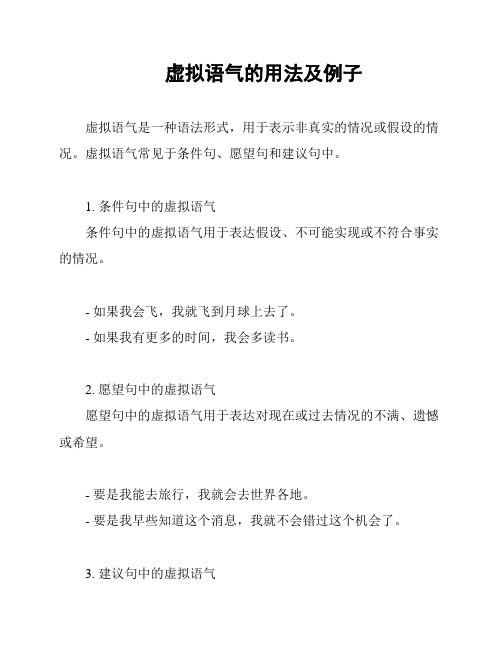
虚拟语气的用法及例子
虚拟语气是一种语法形式,用于表示非真实的情况或假设的情况。
虚拟语气常见于条件句、愿望句和建议句中。
1. 条件句中的虚拟语气
条件句中的虚拟语气用于表达假设、不可能实现或不符合事实的情况。
- 如果我会飞,我就飞到月球上去了。
- 如果我有更多的时间,我会多读书。
2. 愿望句中的虚拟语气
愿望句中的虚拟语气用于表达对现在或过去情况的不满、遗憾或希望。
- 要是我能去旅行,我就会去世界各地。
- 要是我早些知道这个消息,我就不会错过这个机会了。
3. 建议句中的虚拟语气
建议句中的虚拟语气用于表达对某种行动或情况的建议、要求或命令。
- 尽量少吃甜食,要不然你会发胖的。
- 要是你需要帮助,尽管告诉我。
虚拟语气通过使用虚拟动词和特殊的句子结构来表达。
在中文中,通常使用“如果……就……”、“要是……就……”、“如果能……就……”等句式来表示虚拟语气。
需要注意的是,虚拟语气在口语和书面语中的使用有所不同。
在口语中,虚拟语气的使用相对较少,而在正式的书面语或文学作品中,虚拟语气的使用相对较多。
希望本文对你理解和运用虚拟语气有所帮助!。
虚拟语气讲解
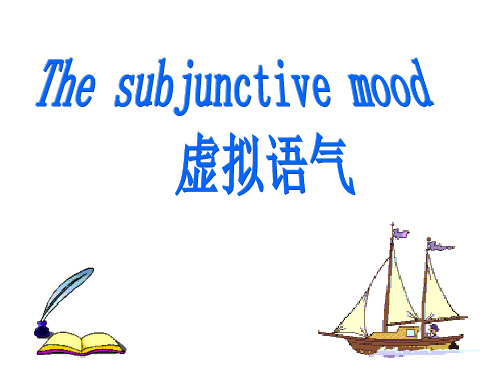
What would have happened, _____ as far as the river bank? (01 上海) A. Bob had walked farther B. if Bob should walk farther C. had Bob walked farther D. if Bob walked farther
C
二、虚拟语气在名词从句中的运用 (1)用于宾语从句 1、wish 后面的宾语从句中。 一般用虚拟语气,表示一种不可能实现的愿望。其谓 语动词形式为:
表现在
表过去
过去时
过去完成时
表将来 would, might, could+动词原形 I wish (that) I were a bird.
I wish (that) I had seen the film last night. I wish (that) I would\could go.
虚拟语气
虚拟语气的概念
虚拟语气是一种特殊的动词形式,一是用来
表示说话人所说的话不是一个事实,而是一 种假设、猜测、怀疑等(在条件从句中或让步 状语从句中);一是表示说话人的愿望、要求、 命令、建议等 (在宾语从句、表语从句、同位 语从句)。
虚拟语气在 在条件从句中
虚拟条件句
与现在 事实相 反的假 设 与过去 相反的 假设 与将来 相反的 假设
2. 在某些动词后的宾语从句中需用should+动词原形的 虚拟语气形式。“should”可以省略。 常见的动词有: 一个坚持insist; 两个命令order, command ; 三条建议suggest , advise, propose; 四项要求demand, request, require, ask; 另外还有prefer
虚拟语气

1.过去式 过去式 would/could/should 将来 2. should+ V.(原) 原 /might +V.(原) 原 3. were to do
4. It’s (about/high) time +that
过去时(did/were) 过去时 Should(不省) +V.
你该走了。 你该走了。
It’s high time that you went. It’s high time that you should go.
我们该去
It’s time that we went to bed.
★
现在: 现在:过去时 3. as if /though + 从句 过去: 过去: 过去完成时
★ ★
She loves the baby as if it were her own son. I remember the whole thing as if it had
happened yesterday.
3) What ____ last night if you ____ to do your B washing? A. would you do, hadn’t had B. would you have done, hadn’t had C. would you do, didn’t have D. would you have done, didn’t have 4) If I had hurried, the train ____ . D A. would catch C. had caught B. would have caught D. would have been caught
虚拟语气英语知识点总结

虚拟语气英语知识点总结一、虚拟语气的概念。
虚拟语气是一种特殊的动词形式,用来表示说话人所说的话不是一个事实,而是一种假设、愿望、怀疑、猜测或建议等。
二、虚拟语气在条件句中的用法。
1. 与现在事实相反的虚拟条件句。
- 结构:从句(If + 主语+ 动词的过去式(be动词一般用were)),主句(主语+ would/should/could/might+动词原形)。
- 例如:If I were you, I would study harder.(如果我是你,我会更努力学习。
实际上我不是你)2. 与过去事实相反的虚拟条件句。
- 结构:从句(If+主语+had+过去分词),主句(主语+would/should/could/might + have+过去分词)。
- 例如:If he had taken my advice, he would have passed the exam.(如果他听了我的建议,他就会通过考试了。
实际上他没听建议,也没通过考试)3. 与将来事实相反的虚拟条件句。
- 结构:从句(If+主语+动词的过去式/should+动词原形/were to+动词原形),主句(主语+would/should/could/might+动词原形)。
- 例如:If it rained tomorrow, we would stay at home.(如果明天下雨,我们就会待在家里。
明天是否下雨还不确定,但这是一种假设情况)- 或者If he should come tomorrow, I would tell him the news.(如果他明天来,我就会告诉他这个消息)- 以及If I were to see her tomorrow, I would give her the book.(如果我明天见到她,我就会把书给她)三、虚拟语气在宾语从句中的用法。
1. wish后的宾语从句。
- 表示与现在事实相反的愿望,从句谓语动词用过去式(be动词用were)。
虚拟语气
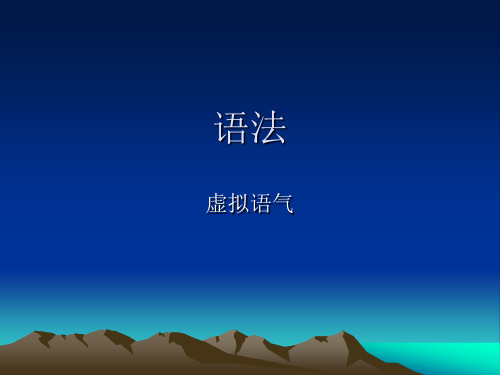
虚拟语气
何为虚拟语气?
• 虚拟语气是一种动词形式,表示说话人的 一种愿望、假设、怀疑、猜测、建议等含 义,它所表示的含义不是客观存在的事实。 如: • If I were you, I‘d take them away.如果我是 你的话,我就会带走他们。 • He suggested that our class should be divided into five groups.他建议说我们班应 该分为五个小组。
虚拟语气在状语从句中的用法
• •
• • •
A 在条件状语从句中的用法:虚拟语气在表示条件的状语从句中的使用最常见。
表示与现在事实相反的假设:若表示与现在事实相反的假设,条件从句用一般过去时, 主句中用“would/should/might+动词原形”的形式:If my brother were here, everything would be all right.要是我哥哥在这,一切都没有问题了。 表示与过去事实相反的假设:若表示与过去事实相反的假设,条件状语从句中用过去完 成时,主句中用谓语动词“should/would/could/might +have done”的形式:If I had set off a little earlier, I would have caught the train. 表示与将来事实相反的假设:若表示与将来事实的假设,条件状语从句中用一般过去时、 should+动词原形或were to+原形,主句中谓语动词用should/would/could/might+动词原形的形式: If it were fine tomorrow, I would go shopping.如果明天天气好,我就去买东西。 错综时间条件句:错综时间条件句指条件状语从句表示的动作发生的时间不一致,即条 件从句表示与过去事实相反,主句表示与现在事实相反;或条件从句表示与现在事实相反,主句表 示真实情况:If he had set out earlier, he would be home tomorrow.如果他早点出发的话,现在就 已经到家了。 含蓄条件句:有时为了表达的需要,在虚拟语气中并不总是出现if引导的条件句,而通 过其他手段如介词(短语)with ,without ,but for,副词otherwise,或其他从句来表示虚拟语气的条件: What should I do with a million dollars? 如果你有一百万美元,你会怎么做? We could not have finished the work ahead of time without your help.如果没有你的帮助,我们不会提前完成任务。 But for the rain, we could have held the sport meet.如果不是下雨的话,我们就开运动会了。
十大虚拟语气词

十大虚拟语气词一、insist1、含义:vt. 坚持;坚决主张,vi. 坚持;强调。
2、用法insist的基本意思是“坚持”,常用于坚持意见、看法、主张等。
insist既可用作及物动词,也可用作不及物动词。
作及物动词时,不能用名词、代词或动词不定式作宾语,只能接that引导的从句。
若指尚未发生的动作,从句谓语常用虚拟语气(should+动词原形或直接用动词原形);若表示一个已发生的动作或已存在的状态时,从句谓语多用陈述语气。
that有时可以省略。
insist用作不及物动词时,其后常须加介词on〔upon〕,然后接名词、代词或动名词。
该动名词前可加物主代词或名词、人称代词的宾格形式作其逻辑主语,该动名词的否定形式是在其前直接加not。
He insisted that he had done right.他坚决认为自己做对了。
They insist that I stay there for supper.他们坚决要求让我留下吃晚饭。
二、command1、含义:n. 命令;指挥;掌握;[计算机] DOS命令: 引用辅助命令处理器,v. 命令;指挥;掌握;博得。
2、用法command用作动词是正式用语,表示“命令,要求”时,一般不用作进行时;其后可接名词或代词作宾语,接带动词不定式的复合结构和that从句时,从句中的谓语动词应用虚拟式,即“(should+)动词原形”。
command在书面语体中可以引出直接引语,作“命令道”或“用命令的口气说道”解。
He growled a command to her to stop.他咆哮着命令她停下来。
The company commander roared his command.连长高声发布命令。
三、suggest1、含义:vt. 建议;暗示;使想起;表明;要求。
2、用法suggest的基本意思是“建议”“提议”,还可表示“暗示,表明”“使想起”等。
suggest作“建议”“提议”解后接that从句作宾语时,从句中的谓语动词要用虚拟式; 作“表明,暗示”“使想起”等解时,从句中的谓语动词可用陈述式。
虚拟语气语法总结
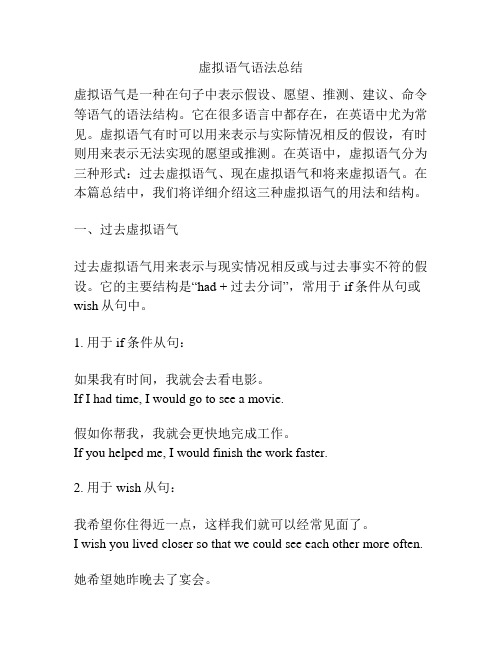
虚拟语气语法总结虚拟语气是一种在句子中表示假设、愿望、推测、建议、命令等语气的语法结构。
它在很多语言中都存在,在英语中尤为常见。
虚拟语气有时可以用来表示与实际情况相反的假设,有时则用来表示无法实现的愿望或推测。
在英语中,虚拟语气分为三种形式:过去虚拟语气、现在虚拟语气和将来虚拟语气。
在本篇总结中,我们将详细介绍这三种虚拟语气的用法和结构。
一、过去虚拟语气过去虚拟语气用来表示与现实情况相反或与过去事实不符的假设。
它的主要结构是“had + 过去分词”,常用于if条件从句或wish从句中。
1. 用于if条件从句:如果我有时间,我就会去看电影。
If I had time, I would go to see a movie.假如你帮我,我就会更快地完成工作。
If you helped me, I would finish the work faster.2. 用于wish从句:我希望你住得近一点,这样我们就可以经常见面了。
I wish you lived closer so that we could see each other more often. 她希望她昨晚去了宴会。
She wishes she had gone to the party last night.二、现在虚拟语气现在虚拟语气用来表示与现实情况相反或不太可能实现的愿望、建议、要求等。
它的主要结构是“should + 动词原形”或“were + to + 动词原形”。
1. 用于虚拟的愿望:如果我是你,我会马上辞职。
If I were you, I would quit my job immediately.(“were”表示与现实情况相反的假设)我希望你明白我的意思。
I wish you understood what I mean.(“understood”表示与现实情况不符的愿望)2. 用于虚拟的建议和要求:你应该尽早去看医生。
- 1、下载文档前请自行甄别文档内容的完整性,平台不提供额外的编辑、内容补充、找答案等附加服务。
- 2、"仅部分预览"的文档,不可在线预览部分如存在完整性等问题,可反馈申请退款(可完整预览的文档不适用该条件!)。
- 3、如文档侵犯您的权益,请联系客服反馈,我们会尽快为您处理(人工客服工作时间:9:00-18:30)。
虚拟语气•虚拟条件句•其它方式表虚拟条件•原型虚拟•wish从句•would rather/would sooner•as if从句•for fear that, fearing (that), in case (that), lest•It is (high) time that…从句中•If only 从句中一、虚拟语气用于条件句1、与过去情况相反if条件句:had+过去分词主句:would(should,could,might)+have p.pIf he had attended the meeting yesterday, he could have met me.If you had worked harder, you would have passed the exam.2、与现在情况相反if条件句:过去式(be 要用were)主句:would(should,could,might)+ VIf I had enough money, I would buy that house.If I were you, I would study English harder.3、与将来情况可能相反if条件句:were to + V、should + V、过去式(be 要用were)主句:would(should,could,might)+ VIf they should go there next week, they would get a big surprise.If I were to do it, I would do it in a different way.二、虚拟条件句的倒装虚拟条件句的从句部分如果含有were, should, 或had, 可将if省略,再把were, should或had 移到从句句首,实行倒装。
If they were here now, they could help us.=Were they here now, they could help us.If you had come earlier, you would have met him.=Had you come earlier, you would have met himIf it should rain, the crops would be saved.= Should it rain, the crops would be saved.三、其他方式表达虚拟条件without,but for,otherwise,or,but that,given,provided,supposing,were it not forIf I had enough time, I could finish the work.= With enough time, I could finish the work.If he hadn’t worked hard, he wouldn’t have succeeded.= Without hard work, he wouldn’t have succeeded.Were it not for your help, I couldn’t do it.= Without your help, I couldn’t do it.四、原型虚拟(should+) V标志性词:表示命令、建议、要求标志词—动词suggest, propose, advise, recommend, move, order, ask(要求), demand, require, request, urge, insist, determine, decide, desire, prefer, etc.1.V + 宾语从句I suggest that we (should) hold a meeting soon.He insisted that he (should ) be sent there.2.It is + p.p. + that-从句(此时为主语从句)It is advised that a meeting be held soon.如suggest, insist不表示“建议”或“坚持要某人做某事”时,即它们用于其本意“暗示、表明”、“坚持认为”时,宾语从句用陈述语气。
I insisted that you were wrong.Y our pale face suggests that you are ill.标志词—名词suggestion, proposal, advice, idea, plan, order, request, requirement, instruction(指令), resolution(决议), recommendation, decision, motion (提议), preference (选择), necessity(必要性), etc.1。
N. + be + that从句(表语从句)My proposal is that we (should) hold a meeting next week.My idea is that we (should) get more people to attend the conference. 2。
…n. that从句(同位语从句)…I made a proposal that we (should) hold a meeting next week.标志词— necessary, significant, important, natural, strange, advisable(明智的), appropriate(适当的), desirable(令人满意的), essential(必要的), imperative(命令的), proper(得体的), urgent( 紧迫的), vital (极其重要的), a pity, a shame, no wonder, etc.句型:It is necessary(…) + that从句(主语从句)It is necessary that he (should) come to our meeting tomorrow.It is important that children be taught at an earlier stage.五、wish从句1.表示现在或将来的愿望,从句中过去式. (be were)I wish I went with you.I wish I were young.2.表示过去的愿望, 从句用过去完成式或would, could, might + have + 过去分词.I wish you had written to him.I wish I could have slept longer this morning.3. 主句如为wished, 其后从句中的动词形式不变.4. 从句中用would , could,might一般表示对现状不满或希望未来有所改变或请求I wish he would answer my letter.I wish he could help me.I wish you would stop asking silly questions.六、表“宁愿”的would rather, would sooner, would (just) as soon 后的从句•过去:had + p.p. 现在:过去式•将来:过去式;动词原型;should + VJohn would rather that she had not gone to the party yesterday evening.I'd rather you were not involved in the case.I'd rather you didn't do anything about it for the time being.我宁愿你现在对此事什么也不要做。
I would rather you go tomorrow.七、as if 似乎,仿佛,引出方式状语从句如果表示真实情况应该用直陈语气;如果表示非真实情况则应该用虚拟语气He looked as if he was ill. (真实)He looked/looks as if he were ill. (虚拟)They talked as if they had known each other for ages.八、for fear that, fearing (that), in case (that), lest引出的目的状语从句•从句中动词形式:(should) + VHe took his umbrella with him lest it rain.I'll keep a seat for you in case you should change your mind.They burned all the important documents for fear that they fall into the enemy's hands.九、It is (high) time that…从句中,谓语动词用“过去式”, "该是……的时候了"。
It is time that we got ready for the final exam.It is high time that we had our lunch.It is about time that he made up his mind.十、If only…从句:表示一种愿望或是向往,“要是……就好了”、“但愿……”。
虚拟式与wish后从句相同。
If only she could understand my real feelings.If only Mary had survived the disease.If only he would find a satisfactory job after his graduation.Exercises• 1. __C__ she did not like it, I would not have bought it.A. Did I knowB. If I knewC. Had I knownD. I had known• 2. Had he really been ill, he __A__ in bed that day.A. should have beenB. should beC. must beD. would be• 3. ___B___ in your place, I would not do that.A. Was IB. Were IC. If I wasD. If I should be• 4. Had she received your invitation, she__D__ your wedding.A. attendedB. had attendedC. must have attendedD. would have attended• 5. If he__A__ that flight then, he would have been killed in that plane crash.A. had takenB. have takenC. tookD. would take• 6. _C__ a black, he might not have been executed five years ago.A. Were he notB. If he was notC. Had he not beenD. He had not been•7. Had you got up earlier this morning, you __B_ in such a hurry now.A. would not have beenB. would not beC. not beD. should not have been•8. If there should be another earthquake, what _C__ ?A. will we doB. must we doC. should we doD. did we do•9. If she _D__ ten years younger, she would be a career woman.A. wasB. isC. should beD. were•10. If it__A___ this weekend, I should not come here.A. should snowB. snowedC. snowsD. will snow•11. One day earlier, and we ____D_____ a big deal with Dell.A. had madeB. ought to makeC. were makingD. should have made•12. Without the inventive work of our forefathers, science and technology__C__ so many advances in the past 30 years.A. have not achievedB. needn't have achievedC. would not have achievedD. would have achieved•13. She kept her voice as low as possible ____C____ she should be heard.A. otherwiseB. butC. for fear thatD. but for•14. I wish I ____B___ the movie last week.A. have seenB. had seenC. sawD. would have seen •15. I wish I ___A____ the whole morning. I am too sleepy.A. could have sleptB. sleptC. were sleepingD. have slept •16. I wish I ____D_____English as freely as a native speaker.A. speakB. did speakC. spokeD. could speak•17. But for the storm, we ___C___ to Shanghai.A. have beenB. have goneC. should have beenD. were going•18. I would rather you ___A____ right now.A. had your radio fixedB. will fix your radioC. should have fixed your radioD. could have your radio fixed •19. My mother would sooner that I ____A____ a doctor.A. should beB. needn't beC. wasD. might have been •20. The baby is starving. Or she ___B____.A. would keep cryingB. would not keep cryingC. need have criedD. may have kept crying•21. It is essential that you ___C___ for leave if you cannot attend classes.A. should have askedB. be askedC. askD. had asked•22. It is proposed that a committee ____D___ to look into the murder case.A. is set upB. set upC. would be set upD. should be set up •23. I followed his advice that I ____D___ in bed for a week.A. must stayB. need stayC. stayedD. stay•24. It is advisable that you ____B____ about her illness.A. have not toldB. not tellC. would not tellD. do not tell •25. My father insisted that he ___A__ right.A. wasB. must beC. beD. were•26. The statistics suggest that the crime rate ___D___ on the rise recently.A. wasB. beC. have beenD. has been•27. It is necessary that the new project ___B___ at once.A. startsB. be startedC. is startedD. start •28. It is natural that you ____A____ at home looking after our baby. A. should stay B. would stay C. not stay D. would not stay •29. She insisted that the matter ____D____ to the manager.A. reportedB. is reportedC. must be rep ortedD. be reported •30. John suggested that his parents ____D_____ a good rest at home. A. having B. had C. have had D. have。
